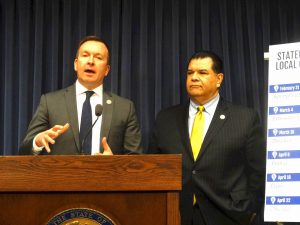Rural pharmacies to receive state financial help
By Peter Hancock Capitol News Illinois — June 27, 2019
State Sen. Andy Manar (left), D-Bunker Hill, speaks during a news conference Feb. 21 at the Capitol in Springfield along with Sen. Martin Sandoval, D-Cicero. Manar on June 24 applauded the implementation of the Critical Access Care Pharmacy Program, for which he had been pushing for state funding since the program was established in 2018. (Capitol News Illinois photo by Peter Hancock)
SPRINGFIELD – Independent pharmacies that serve Medicaid patients in small communities in Illinois will soon start receiving additional payments from the state.
The Department of Healthcare and Family Services confirmed June 24 that it has begun implementing a program lawmakers established in 2018 known as the Critical Access Care Pharmacy Program, which provides up to $10 million a year in additional reimbursements for independent, brick and mortar pharmacies located in counties with fewer than 50,000 people.
Under the program, qualifying pharmacies receive quarterly payments from the state, based on the number of prescriptions they fill that are reimbursed by the state’s Medicaid program.
A spokesperson for DHFS said Monday, June 24 the agency does not have data reflecting how many Illinois pharmacies qualify for the program.
The program was included as part of the budget package that lawmakers approved during the 2018 session. It will be funded for a second year in the budget that takes effect July 1.
“This administration worked aggressively to launch this vital program as rapidly as possible, and we are pleased to help support local pharmacies that are so often critical to our members and to communities throughout Illinois,” said John Hoffman, DHFS director of communications and public affairs.
State Sen. Andy Manar, D-Bunker Hill, who pushed for funding of the program, said in a statement Monday that the program is intended to help small, independent pharmacies in small towns stay in business.
“This funding is going to be a major boost for rural pharmacies and will help keep them open while we find ways to combat the rising cost of prescription drugs,” he said. “I’m glad to see that we’re finally leaving the gridlock of the past behind and bringing this needed program to communities that are at risk of losing their local pharmacies.”
Manar was the lead Senate sponsor of another bill this year, House Bill 465, that he said is intended to help independent pharmacies compete with larger retail chain pharmacies. That bill, which passed both chambers and is awaiting Gov. J.B. Pritzker’s signature, would bring pharmacy benefit managers, or PBMs, under regulation by the Illinois Department of Insurance.
PBMs are companies that negotiate drug prices on behalf of health insurance plans, often resulting in steep discounts that only large chain pharmacies can afford to provide.
Lawmakers considered several other bills this session that were aimed at addressing the rising cost of prescription drugs, none of which made it through the General Assembly.
House Bill 2880, sponsored by Rep. Will Guzzardi, D-Chicago, would have imposed a tax on prescription drugs whenever their prices rose more than the rate of inflation. It was never reported out of its committee.
House Bill 3493, also sponsored by Guzzardi, would have established a state board to regulate prescription drug prices in Illinois. It also failed to come out of committee.
House Bill 156, sponsored by Rep. Mary Flowers, D-Chicago, would have required insurance companies to report certain prescription drug pricing and spending information to the Department of Public Health. It passed out of the House but died in the Senate.
And House Bill 1441, filed by Rep. Anna Moeller, D-Elgin, would have authorized a program through which the state of Illinois could import prescription drugs from licensed, regulated Canadian suppliers. The bill stalled in its committee.
phancock@capitolnewsillinois.com



